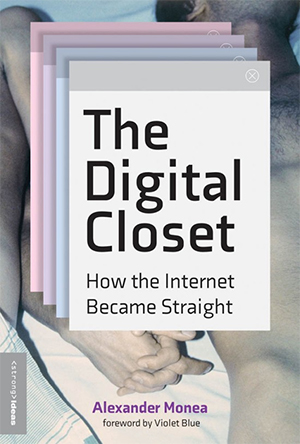How the Internet Became Straight

An algorithm is only as good as its input data and training parameters, and when it comes to moderating sexual speech, the data is hopelessly flawed. The parameters designed by Silicon Valley coders are not much better. Prejudices infect the training data, code, and coders behind automated content moderation to deleterious effect, argues Alexander Monea, the author of a new book called “The Digital Closet: How the Internet Became Straight.” The result: algorithms encoded with heteronormative biases that over-scrutinize, police, and suppress LGBTQIA+ discourse.

Monea calls this new regime of moderation the digital closet — a term meant to signify the ways in which LGBTQIA+ individuals may be allowed to enter the digital public sphere but only so long as they obscure their sexual identities. In his book, he explains how the United States’ 30-year “war on porn” has brought about the over-regulation of sexual content, which, in turn, has resulted in the censorship of much nonpornographic content — including material on sex education and LGBTQ+ activism. I asked Alexander to talk about some of the cultural, technological, and political conditions that put LGBTQ+ content into the closet and to explain a core argument of “The Digital Closet” — that the silencing of sexual speech online is foundational in weaponizing and furthering the agenda of far-right extremism, systemic racism, misogyny, and the erasure of queer culture.
Zoë Kopp-Weber: How did you find yourself writing “The Digital Closet”? Was there an inciting event or a vested interest that inspired you?
Alexander Monea: I didn’t set out to write this book but instead stumbled into it. I had been researching natural language processing algorithms and was invited to present at a conference more focused on visual culture. I decided that computer vision algorithms were similar enough that I could learn about and speak to them. When I was deciding which algorithms to work on, I tried to think of which were most successful — most of the examples I could think of were comically bad (e.g., computers radically misidentifying everyday objects). I realized that at some point in the 2010s, porn had stopped appearing regularly in my everyday search results — prior to that I remember nearly every Google Image search eventually leading to porn. So, I decided to look into porn filters for the conference presentation.
To my surprise, I found very few people examining these algorithms and datasets and I also found them to be loaded with bias. They were filled with people dressed in blackface, radically homophobic language, and all sorts of our cultural prejudices that lead to marginalization. I tried to get the word out quickly but to no avail. I spent hours outlining my findings to a writer at The Atlantic in hopes of drawing attention to the problem and went through eight revisions of a peer-reviewed article that has still not made it to press (largely because it was “too easy to read”). As I kept digging and responding to feedback from people, the piece grew and grew until eventually it was a book. I’ve tried to faithfully represent the issues facing LGBTQIA+ internet users and capture their voices wherever possible, as I have never and will never face the severity of marginalization they experience on an everyday basis both online and off. My hope is that this book is a launching point rather than a definitive edition that other people can build off of, even if that means tearing down anything and everything I’ve done.
“In many ways the concept [of heterosexuality] came into everyday use in an attempt to liberate sexuality from its theologically ordained role for procreation and procreation only.”
ZKW: You analyze the American iteration of heteronormativity that has developed over the past 150 years or so by predominantly white, middle-class, ostensibly heterosexual Americans. Can you briefly explain your approach to someone who may be familiar with the word heteronormativity but not familiar with what’s at stake here?
AM: Heterosexuality is a slippery concept because it is defined more by what it isn’t than by what it is. In its imagined state it is perhaps vaginal missionary sex between two married, monogamous, able-bodied white people assigned opposite sexes at birth and of a similar age. It takes place in the privacy of their bedroom with no cameras on, no sex toys, outfits, or roleplaying, and its success hinges on the male orgasm.
The problem with this definition is that this isn’t how most straight people have sex. They deviate to greater or lesser degrees from any number of these norms. Where do we draw the line? Is all sex straight until two people assigned the same sex at birth are involved? If so, are you a heterosexual if you have a threesome? If a trans man and a trans woman partner up, are they straight? Are two white, monogamous, married, able-bodied gay men more or less “normal” than someone with a vore fetish or a scat fetish?
In tracing the history of heterosexuality in the United States, we can see how the context within which the term emerged helps to explain why we have such an ambiguous concept. In Europe the word “heterosexual” first emerged in a clinical setting to describe men and women who had a perverse desire for opposite sex intercourse (i.e., beyond the bounds of the procreative impulse). In many ways the concept came into everyday use in an attempt to liberate sexuality from its theologically ordained role for procreation and procreation only. In so doing, a sort of devil’s bargain was slowly struck, where people could have non-procreative sex without threat of ostracization provided they maintained many of the patriarchal familial trappings that were connected to procreation. Non-procreative sex needed to be between people that were in love, in long term committed relationships, if not marriages — in short, it needed to resemble Christian procreative sex as much as possible.
Additionally, the new normal needed special exceptions for men, who were presumed to have an insatiable biological desire for sex. If men were white and middle class, they were permitted transgressions, albeit they needed to be with unmarriageable women, like working class women, people of color, sex workers, or some combination of these. If men were nonwhite or working class, they needed increased policing to prevent them from having sex with middle class white women.
Heterosexuality today is such an ambiguous concept because it originated to meet these myriad demands of liberating sex from Christian procreation and preserving elements of the nuclear family while also assigning different permissions to men based on their race and class. While one would hope that this ambiguity would diminish its normative power because of how easily one can demonstrate how ineffective it is at helping us understand sex today, its ambiguity is instead nefarious. The inability to pin it down allows it to slip away from critiques, always appearing in another guise or permutation, like another head of the hydra popping up.
ZKW: In chapter one you examine the manosphere, digital misogynists found within groups like the NoFap movement, Proud Boys, and incels. How did these groups find an alliance with anti-porn feminists and Christian conservatives on the role pornography plays in contemporary American life?
AM: The alliance is really formed by a vested interest in disciplining women’s bodies, though each group has arrived at this conclusion very differently. For instance, each group is interested in regulating and disciplining sexuality, anti-porn feminists by turning to the criminal justice system, Christian conservatives by turning to God’s judgment (and legislation and regulation in the interim), and digital misogynists through vigilantism in which they joyfully take on the role of ultimate authority, investigating, judging, and punishing women themselves.
The process by which anti-porn feminists and Christian conservatives came to align in the 1980s and 90s is maybe old news at this point. The emergence of “alt-right” digital misogynists is the interesting and terrifying new component. Many understand themselves as being unfairly denied access to women’s bodies for sexual gratification — a position shared widely amongst the “toxic geeks” who hold power in Silicon Valley. They are enraged that women are able to leverage their desire to extract money from them, particularly online sex workers, who they are forced to turn to after being denied one-on-one intimacy in real life. Many of these men’s rights movements online focus on curbing “porn addiction” and returning to traditional gender roles and a sexual economy in which women held much less (if any) power. This latter investment in biologically determined gender roles is the hinge point that ends up connecting their misogyny to heteronormativity and conservative Christian ideology.
ZKW: How does this ideology tie into the broader themes of your book?
AM: Heteronormativity and cisnormativity, particularly pseudoscientific and biologically essentialist notions of traditional gender roles, are the bedrock that allow strange bedfellows to lie together. In nearly every other aspect of their politics, digital misogynists — or what the media would’ve called the alt-right during Trump’s presidency — radically differ from one another, so much so that it is hard to imagine them collectively organizing on any other platform. While some may view White supremacy as another lynchpin of their collective identity, there is still quite a bit more variance in their understandings of race and position on White supremacy and cultural imperialism than there is in their understanding of gender and sexuality. Heteronormativity and cisnormativity are thus the nexus that make their politics possible.
ZKW: Tumblr officially banned “adult content” in late 2018, disproportionately affecting LGBTQ+ content creators. In what ways did Tumblr’s roll out of this ban reflect the encoded biases you discuss in “The Digital Closet”?
AM: Tumblr’s porn ban encapsulates a lot of the criticisms of the book. First, Tumblr courted LGBTQ+ users and sex workers by offering a safe space online free of overzealous censorship, using them to keep itself afloat only to renege on that promise at the first sign that they might be able to better grow and monetize by implementing broad censorship policies. Second, Tumblr shows the systemic and cultural dimension of the problem, as their abandonment of the LGBTQ+ and sex worker community came in response to the anti-pornography demands of corporations that might advertise on Tumblr’s platform. This shift also occurred in the wake of FOSTA-SESTA, sweeping federal legislation ostensibly meant to target sex trafficking but which conflates sex work with sex trafficking and targets online pornography for federal regulation.
“The automated content moderation algorithms that Tumblr implemented to help institute its new ban on ‘pornographic’ content was comically inept, but with tragic consequences.”
Lastly, the automated content moderation algorithms that Tumblr implemented to help institute its new ban on “pornographic” content was comically inept, but with tragic consequences. Many LGBTQ+ archives lost their entire catalogs overnight with no redress and no way to recover their lost content or user base. LGBTQ+ pornography disappeared overnight leaving many people with ready access only to heteronormative porn on tube sites. And many non-pornographic LGBTQ+ communities were swept up in the overzealous censorship and similarly shuttered without warning or recourse.
ZKW: You cover at length in the book the impact that FOSTA had on sex workers, particularly LGBTQIA+ sex workers. Traditional financial entities like JPMorgan Chase, Visa, and MasterCard, you explain, have routinely denied their services not only to sex workers but also any small business, artist, or independent contractor whose business happens to center on sex. How do these practices further reflect heteronormativity?
AM: Really in two ways. They do so indirectly by maintaining a cultural silence around sex, which tends to reinforce the status quo. Consider this metaphor: If we were watching the polls during a Presidential primary and one candidate was winning before a long media blackout, many would assume during the blackout that the same candidate was in the top position. Similarly, not talking about or seeing representations of sex prevents us from seeing new forms of desire that are emerging or alternatives to the status quo.
That said, I know that argument might be rather esoteric for some. There is a much more direct way that denying financial services to people considered to be producing “adult content” reinforces heteronormativity. The largest and most well capitalized businesses are able to escape these regulations either by direct negotiations with providers of financial services or through expensive litigation. These companies also tend to be heterosexually oriented, since that is the presumed least common denominator amongst their demographic and thus gives them the widest consumer base. More niche LGBTQIA+ companies do not have the clout or the resources to obtain exceptions to the overbroad terms and conditions that these financial services providers are instituting.
Let’s take a look at a concrete example: Trojan is one of the oldest and largest condom producers in the United States. They frequently run heterosexually oriented advertisements where men find themselves engaging in spontaneous sex with women and need a condom (a heterosexual male fantasy). Trojan has been able to maintain access to financial services with all of the aforementioned companies. In contrast, Lovability, a condom company that stresses gender equality and safe sex in its branding and advertisements, was denied financial services by Chase, which only relented after their denial of service made national headlines.
Similarly, Amazon, CVS, and many other retailers sell sex toys in their online storefronts with no punishment, but a company like the New York Toy Collective, which focuses on providing safe, high-quality, and self-affirming sex toys was denied financial services by Chase. There are as many instances of this as you care to dig up.
ZKW: You argue that a revolutionary response to “the digital closet” is a more or less radical break from our current ideology. What are some of these radical initiatives and how might they counteract the issues mentioned in your book?
AM: In the book I outline an initial set of strategies and goals that might be employed to combat the increasing heteronormativity of the internet. These conclusions are only meant to be provisional — not only do social movements need to remain adaptable to changing conditions, but I also have less experience in organizing and trust that others can better articulate appropriate responses.
The responses I outline range from tamer attempts at revision to more revolutionary attempts to break with the current infrastructure of the internet. The more immediate and revisionist solutions involve advocating for more fairness, transparency, accountability, and ethics in the regulation of “adult content” online. I call for interested parties to better document biased censorship and produce stronger arguments that LGBTQIA+ censorship is a feature rather than a bug online, renew public debate on what constitutes “pornography” and center LGBTQIA+ voices, press tech companies to commit to anti-censorship, demand better adjudication mechanisms for unduly censored content, and demand transparency and explicability in censorship processes, whether they are conducted by algorithms or human reviewers.
On the more radical end, I argue that we can’t get this right in the carceral state. We need to defund police, deprioritize the criminal justice system as the mechanism we turn to for solutions to public problems, legalize sex work, and make sex and sexuality key concerns in a welfare state. Additionally, I’m not convinced we can ever trust tech companies to get this right. The internet is too important to be left to petty tyrants, and the platforms that increasingly mediate our access to the internet ought to be governed as public utilities. In the end, what I’d call for is something akin to the internet meme of Fully Automated Luxury Gay Space Communism — a yet-to-be-imagined society built atop radical democracy, robust social welfare, and freedom of self-expression most closely resembled by communism.
Alexander Monea is Assistant Professor in the English Department and Cultural Studies Program at George Mason University. He is the author of “The Digital Closet.”
Zoë Kopp-Weber is a publicist at the MIT Press.



